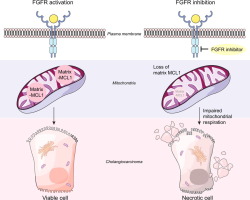当前位置:
X-MOL 学术
›
J. Hepatol.
›
论文详情
Our official English website, www.x-mol.net, welcomes your
feedback! (Note: you will need to create a separate account there.)
Fibroblast growth factor receptor inhibition induces loss of matrix MCL1 and necrosis in cholangiocarcinoma
Journal of Hepatology ( IF 26.8 ) Pub Date : 2018-03-09 , DOI: 10.1016/j.jhep.2018.01.026 Ayano Kabashima 1 , Petra Hirsova 2 , Steven F Bronk 1 , Matthew C Hernandez 3 , Mark J Truty 3 , Sumera I Ilyas 1 , Scott H Kaufmann 4 , Gregory J Gores 1
Journal of Hepatology ( IF 26.8 ) Pub Date : 2018-03-09 , DOI: 10.1016/j.jhep.2018.01.026 Ayano Kabashima 1 , Petra Hirsova 2 , Steven F Bronk 1 , Matthew C Hernandez 3 , Mark J Truty 3 , Sumera I Ilyas 1 , Scott H Kaufmann 4 , Gregory J Gores 1
Affiliation

|
Myeloid cell leukemia 1 (MCL1), a prosurvival member of the BCL2 protein family, has a pivotal role in human cholangiocarcinoma (CCA) cell survival. We previously reported that fibroblast growth factor receptor (FGFR) signalling mediates MCL1-dependent survival of CCA cells and . However, the mode and mechanisms of cell death in this model were not delineated. Human CCA cell lines were treated with the pan-FGFR inhibitor LY2874455 and the mode of cell death examined by several complementary assays. Mitochondrial oxidative metabolism was examined using a XF24 extracellular flux analyser. The efficiency of FGFR inhibition in patient-derived xenografts (PDX) was also assessed. CCA cells expressed two species of MCL1, a full-length form localised to the outer mitochondrial membrane, and an N terminus-truncated species compartmentalised within the mitochondrial matrix. The pan-FGFR inhibitor LY2874455 induced non-apoptotic cell death in the CCA cell lines associated with cellular depletion of both MCL1 species. The cell death was accompanied by failure of mitochondrial oxidative metabolism and was most consistent with necrosis. Enforced expression of N terminus-truncated MCL1 targeted to the mitochondrial matrix, but not full-length MCL1 targeted to the outer mitochondrial membrane, rescued cell death and mitochondrial function. LY2874455 treatment of PDX-bearing mice was associated with tumour cell loss of MCL1 and cell necrosis. FGFR inhibition induces loss of matrix MCL1, resulting in cell necrosis. These observations support a heretofore unidentified, alternative MCL1 survival function, namely prevention of cell necrosis, and have implications for treatment of human CCA. Herein, we report that therapeutic inhibition of a cell receptor expressed by bile duct cancer cells resulted in the loss of a critical survival protein termed MCL1. Cellular depletion of MCL1 resulted in the death of the cancer cells by a process characterised by cell rupture. Cell death by this process can stimulate the immune system and has implications for combination therapy using receptor inhibition with immunotherapy.
中文翻译:

成纤维细胞生长因子受体抑制导致胆管癌基质 MCL1 丢失和坏死
髓样细胞白血病 1 (MCL1) 是 BCL2 蛋白家族的促存活成员,在人胆管癌 (CCA) 细胞存活中发挥着关键作用。我们之前报道过成纤维细胞生长因子受体 (FGFR) 信号介导 MCL1 依赖性 CCA 细胞的存活。然而,该模型中细胞死亡的模式和机制尚未描述。用泛 FGFR 抑制剂 LY2874455 处理人 CCA 细胞系,并通过几种补充测定检查细胞死亡模式。使用 XF24 细胞外通量分析仪检查线粒体氧化代谢。还评估了患者来源的异种移植物 (PDX) 中 FGFR 抑制的效率。 CCA 细胞表达两种 MCL1,一种位于线粒体外膜的全长形式,以及一种位于线粒体基质内的 N 末端截短形式。泛 FGFR 抑制剂 LY2874455 在 CCA 细胞系中诱导非凋亡性细胞死亡,与两种 MCL1 物种的细胞耗竭相关。细胞死亡伴随着线粒体氧化代谢的失败,并且与坏死最为一致。强制表达靶向线粒体基质的 N 末端截短的 MCL1,但不表达靶向线粒体外膜的全长 MCL1,从而挽救了细胞死亡和线粒体功能。 LY2874455 治疗 PDX 小鼠与肿瘤细胞 MCL1 缺失和细胞坏死相关。 FGFR 抑制会导致基质 MCL1 丢失,导致细胞坏死。这些观察结果支持迄今为止未识别的替代性 MCL1 生存功能,即预防细胞坏死,并且对人类 CCA 的治疗具有影响。 在此,我们报告说,治疗性抑制胆管癌细胞表达的细胞受体会导致称为 MCL1 的关键生存蛋白的丢失。 MCL1 的细胞耗竭导致癌细胞通过细胞破裂的过程死亡。这一过程引起的细胞死亡可以刺激免疫系统,并对受体抑制与免疫疗法的联合治疗具有影响。
更新日期:2018-03-09
中文翻译:

成纤维细胞生长因子受体抑制导致胆管癌基质 MCL1 丢失和坏死
髓样细胞白血病 1 (MCL1) 是 BCL2 蛋白家族的促存活成员,在人胆管癌 (CCA) 细胞存活中发挥着关键作用。我们之前报道过成纤维细胞生长因子受体 (FGFR) 信号介导 MCL1 依赖性 CCA 细胞的存活。然而,该模型中细胞死亡的模式和机制尚未描述。用泛 FGFR 抑制剂 LY2874455 处理人 CCA 细胞系,并通过几种补充测定检查细胞死亡模式。使用 XF24 细胞外通量分析仪检查线粒体氧化代谢。还评估了患者来源的异种移植物 (PDX) 中 FGFR 抑制的效率。 CCA 细胞表达两种 MCL1,一种位于线粒体外膜的全长形式,以及一种位于线粒体基质内的 N 末端截短形式。泛 FGFR 抑制剂 LY2874455 在 CCA 细胞系中诱导非凋亡性细胞死亡,与两种 MCL1 物种的细胞耗竭相关。细胞死亡伴随着线粒体氧化代谢的失败,并且与坏死最为一致。强制表达靶向线粒体基质的 N 末端截短的 MCL1,但不表达靶向线粒体外膜的全长 MCL1,从而挽救了细胞死亡和线粒体功能。 LY2874455 治疗 PDX 小鼠与肿瘤细胞 MCL1 缺失和细胞坏死相关。 FGFR 抑制会导致基质 MCL1 丢失,导致细胞坏死。这些观察结果支持迄今为止未识别的替代性 MCL1 生存功能,即预防细胞坏死,并且对人类 CCA 的治疗具有影响。 在此,我们报告说,治疗性抑制胆管癌细胞表达的细胞受体会导致称为 MCL1 的关键生存蛋白的丢失。 MCL1 的细胞耗竭导致癌细胞通过细胞破裂的过程死亡。这一过程引起的细胞死亡可以刺激免疫系统,并对受体抑制与免疫疗法的联合治疗具有影响。











































 京公网安备 11010802027423号
京公网安备 11010802027423号